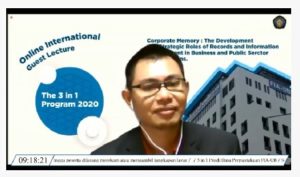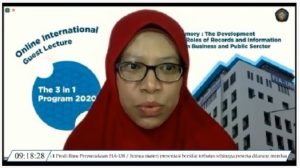

Second day of 3 in 1 Program activities in 2020 Visiting Professor and Professional The Library and Information Science Study Program, Faculty of Administrative Sciences, Universitas Brawijaya was attended by around 190 audiences, both students and lecturers, via the Zoom and YouTube live platforms on Tuesday, October 6 2020. The theme of the second day was Corporate Memory: The Development and Strategic Roles of Records and Information Management in Business and Public Sector Organizations which focuses on records management within a public or business organization.
On the second day of the series, the material was presented by 3 presenters. The first speaker was Professor/Senior Lecturer (guest) Assoc. Prof. Wan Satirah Wan Mohd Saman Ph.D who comes from University Teknologi Mara (UiTM) Malaysia. The second speaker was a Practitioner Lecturer, namely Mr. Abdul Cholil as Chair of P3RI. The third speaker came from a lecturer in the Library and Information Science Study Program at FIA UB, namely Assoc. Prof. Dr. Muhammad Shobaruddin, MA. This guest lecture discusses the development and regulation of records strategies and information management in public and business sector organizations. This event was attended and officially opened by Prof. Dr. Bambang Supriyono, MS as Dean of the Faculty of Administrative Sciences, Brawijaya University. Meanwhile, the person in charge of being the moderator is Muhammad Rosyihan Hendrawan, S.IP., M.Hum (Secretary of the Administration and Archives Gallery, Faculty of Administrative Sciences, Brawijaya University).
Mrs. Assoc. Prof. Wan Satirah Wan Mohd Saman Ph.D as the first speaker explained three topics related to the theme of today's event, namely 1) organizational memory, 2) e-corporate memory, and 3) UiTM corporate memory. The first discussion explains that memory is information produced by an organization or person that has future uses and is part of the record. Then it is explained again regarding problems related to organizational memory, namely 1) too much company memory resulting in difficulties in sorting and retrieving information, 2) lost memory resulting in inefficient time and operations that may stop, as well as factors causing organizational memory. is lost. He also explained the important functions of memory in a company or organization, namely to provide corporate information and stimulate employee abilities. The second discussion explains the process e-corporate memory and an explanation of examples of this in the third discussion by showing memories of UiTM Malaysia organizations such as Perpus Tun Abdur Razak, Jabatan Arkib Universiti, and Galeri Tuanku Nur Zahirah.
Continuing with the second speaker, Mr. Abdul Cholil, explaining about "Managing Personal Data: RIM Strategic Role in Ensuring Compliance”. This material explains 3 discussions, namely 1) industrial regulatory trends, which discuss General Data Protection Regulation (GDPR) which is implemented in Europe to protect people's personal data, 2) the contribution of records and information management, and 3) examples of cases related to this theme such as data leaks on certain sites which can result in misuse of data and what steps should be taken to overcome them the case.
Next, the third speaker is Mr. Assoc. Prof. Dr. Muhammad Shobaruddin, MA explained about "Organizational Memory and Strategy to Facilitate Organizations Create Innovations for Their Competitive Advantage” which explains that knowledge is currently the main focus of society and organizations, giving birth to various scientific developments with the emergence of terms such as Organizational Memory (OM), Knowledge Management (KM), Organizational Learning (OL), and Innovation Management (IM) which is useful for increasing competitive advantages for the organization.

